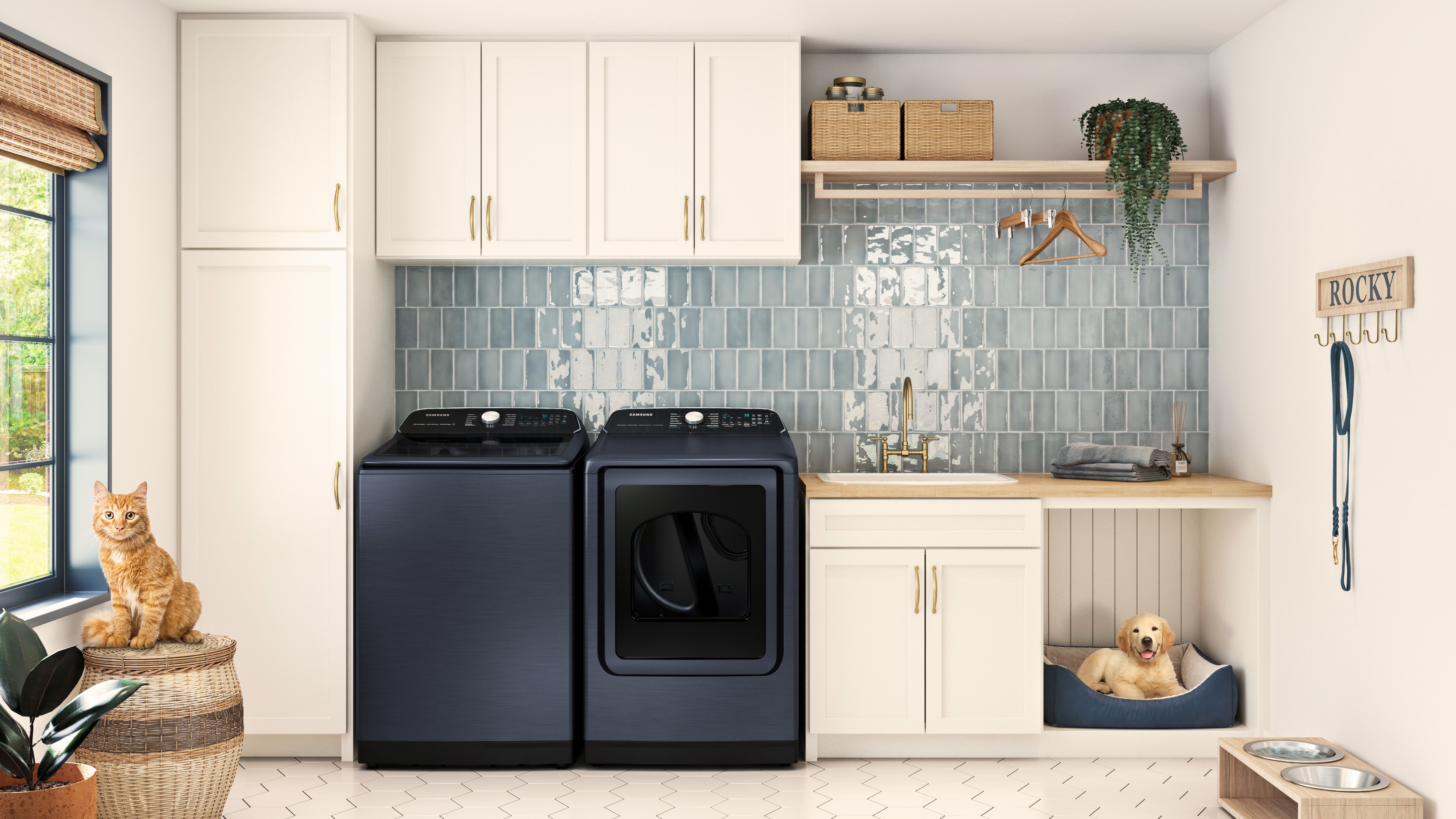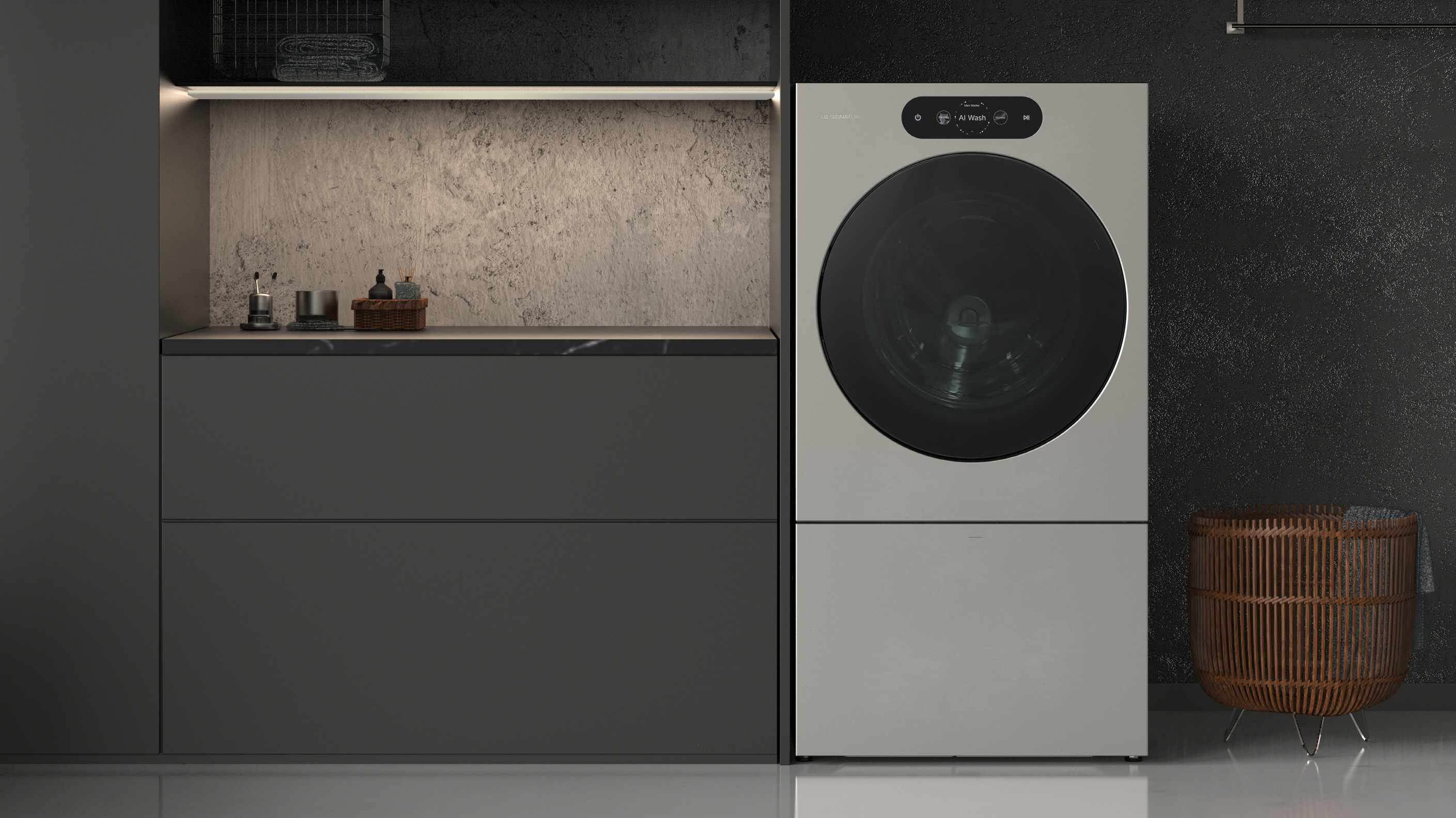5 reasons why you need a dryer in winter
Make drying clothes around the house a thing of the past

Sign up to receive the latest news, reviews, buying guides and deals direct to your inbox
You are now subscribed
Your newsletter sign-up was successful
Drying clothes around the home is less than ideal. It can take ages to hang them up, ages to take them down, and ages to dry. They can make the house look untidy, and that's before any of the health implications are factored in.
It's easy to get around many of these problems in summer, but in the colder winter months, you're faced with little choice. That is unless you have one of the best dryers.
In this article, we explain the five reasons why you need a dryer in winter. We also get expert tips and advice from Alex Lucas, Head of Business Unit, Laundry, BSH Home Appliances, and Michael Forbes, Product Specialist at AEG. Whether you're looking to upgrade your laundry room or trying to decide if one of the best washer dryer combos is worth it, here's what you should consider.
1. Faster drying times
In winter, the reduced daylight hours and colder temperatures can hugely increase the drying time of clothes. Not only does this mean that clothes are draped around the home for long periods, but it can slow down the laundry process: you have to wait for one load to dry before you can wash another. It also increases the chance of your clothes smelling damp.
Add in the unpredictability of winter weather – an unexpected rain shower or snowstorm can leave you with loads of wet laundry – and the best-laid plans become disrupted.
A dryer eliminates this uncertainty while also reducing the drying time compared to traditional drying methods. Some dryers, like the Whirlpool WED4950HW, then offer multiple drying temperatures to make things even faster and more efficient. You can select between low, medium, and high to suit different fabrics and load sizes, while its “AutoDry” drying system means the dryer will stop drying once your clothes have reached the optimum moisture level.

"A dryer offers versatility and adaptability," according to Lucas. "Not only can it dry clothes, but many dryers also have additional features like a delicate cycle for fragile fabrics. This versatility allows you to dry a wide range of items, including blankets, towels, and even shoes that may get wet and muddy during winter outdoor activities."
Sign up to receive the latest news, reviews, buying guides and deals direct to your inbox

Alex has been at BSH for over 20 years and has worked across multiple product categories throughout his time in the home appliance industry.
2. Less ironing
One of the benefits of line drying is that your clothes dry flat, using gravity to remove wrinkles and creases.
However, many of the best dryers, including the Maytag MED7230HW, now offer anti-wrinkle features. Some are even more effective than line drying because you don't have to worry about noticeable folds that come from hanging clothes over a line, nor are there marks where your pegs have been.
Such anti-wrinkle features prevent your clothes from becoming wrinkled and creased during the drying process, or they can be used to remove creases in already wrinkled clothes. This reduces how much ironing you have to do and means you can hang your clothes in the closet straight from the dryer.
To avoid adding creases, "make sure to untangle your items prior to putting them in the dryer," said Forbes. "This will also allow airflow within the dryer and will mean that your appliance won’t be working harder to maintain the optimal temperature."

Michael Forbes is an AEG Product Specialist with 4 years of expertise in the business. He helps bring AEG appliances to life by guiding customers in making informed choices and introducing them to innovative solutions. Michael strives to ensure confidence in achieving dream kitchens through tailored appliance selections.
3. Reduces mold and allergies
"When you dry your laundry indoors on racks, the water from the clothes evaporates into your home, increasing humidity," said Lucas. "This can be unhealthy, creating a favorable environment for the growth of mold and dust mites, which can trigger allergies and respiratory issues."
Forbes added that "indoor drying can take longer and, if put near radiators, can impact the effectiveness of central heating, making your home feel colder."
Dryers not only prevent this and remove the need to hang wet clothes around a cold home, but they can also make sure your clothes are free from allergens that can cling to fabrics when air-dried indoors.
The high temperatures in dryers can kill dust mites and remove pollen, pet dander, and other common allergens, for example. This is particularly beneficial for people and families who suffer from allergies or asthma. Dryers, such as the LG WM399HBA, additionally have dedicated sanitization cycles to target allergens and bacteria. The LG's Allergiene Cycle is even certified by the Asthma and Allergy Foundation of America (AAFA).
4. Saves time, energy and money
There's a common misconception that dryers use huge amounts of energy, meaning they're expensive to run. That may have been the case with older dryers, but many of today's best dryers and washer-dryers are built to be as energy-efficient as possible.
The Samsung DV45K6500GV, for example, is a gas-powered dryer that's been Energy Star certified. This means the dryer has met strict energy efficiency criteria set by the US Environmental Protection Agency and the US Department of Energy. Gas dryers typically cost more initially but cost less in energy usage than their electric counterparts. Gas dryers also tend to run at slightly higher temperatures, so they dry laundry faster and more efficiently.
Most modern dryers are also designed to minimize their environmental impact, using less water compared to older models. This not only helps reduce your household's carbon footprint but leads to further savings on utility bills. If you then compare this to the costs of having your heating running all winter in an attempt to dry clothes around your home, you are more likely to save money both in the short- and long-term.
Tip: To maximize the energy efficiency of your dryer, make sure you're cleaning the condenser unit and door filters regularly. "If the condenser unit accumulates fluff, it becomes less efficient and uses more energy per cycle," said Lucas. Some models, including the Bosch 500 Series Heat Pump Dryer, have features that clean the condenser unit automatically, so you don’t have to.
Forbes added, "When using a washer-dryer or dryer in the winter, avoid opening and closing your dryer door during the cycle as it can extend the cycle time by at least 20 minutes, as it takes the heat pump longer to return to the optimal temperature."

5. Larger capacity
Buying Guides
Best washer dryer combos 2025: all-in-one solutions for your laundry needs, chosen by experts
Best hair dryers: Top-rated blow dryers for all budgets
Reviews
LG DLEX8600BE 7.3 Cu. Ft. Smart Electric Dryer review: over 24 high-tech drying programs
Asko T411VDW 5.1 cu. ft. Stackable Electric Dryer review: ideal for lighter loads
Revlon Perfect Heat Fast Dry Travel Styler review
Winter clothing, from bulky jackets to heavy sweaters, brings its own challenges when it comes to laundry. "Unlike regular clothing, winter garments like cozy sweaters, down-filled jackets, synthetic insulation, and blankets often require extra care due to their thickness and layering of materials," said Lucas. "Thicker materials such as sweaters or blankets also may take longer to dry completely compared to lighter clothing items."
The majority of dryers have specialized programs for down, wool, and delicate items while also being able to handle large loads. The GE GFD55ESSNWW dryer, as one example, has a 7.8 cubic feet capacity, making it ideal for families with lots of laundry to deal with or people with bulky items. As an additional feature, this dryer can be paired with your phone, meaning you can start, stop, and pause your cycle from anywhere.
Completing larger loads of washing in one go also feeds into the cost and energy savings mentioned above.
Final thoughts
Owning a dryer or washer-dryer in winter comes with many more benefits than just convenience.
From drying bulky winter wear to saving on energy, these appliances prove their worth and make them indispensable in the colder months.
Whether you're dealing with the daily demands of a large family or seeking a practical solution for winter laundry challenges, a dryer or washer-dryer is a great investment for any home.

Victoria Woollaston, with nearly 20 years of experience, has reviewed gadgets, beauty tech, and household appliances for WIRED, TechRadar, and Expert Reviews. She specializes in critiquing coffee makers and small appliances for Top Ten Reviews. Victoria is also the founder and editor of inclusive beauty and grooming sites mamabella and MBman.
